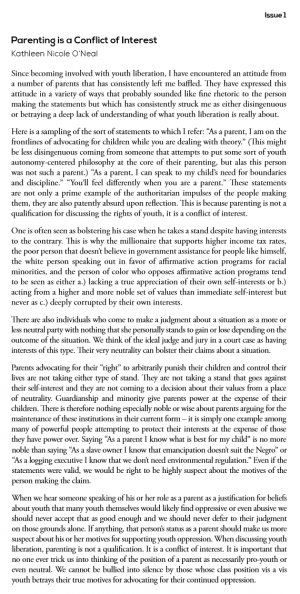Debate Guide: "As a parent" or "as a survivor": Difference between revisions
The Admins (talk | contribs) No edit summary |
The Admins (talk | contribs) No edit summary |
||
| Line 4: | Line 4: | ||
=="As a parent"/"All good parents"== | =="As a parent"/"All good parents"== | ||
<blockquote><font color="green">'''''You clearly have no children. If you did, you would never argue for [POV] because all good parents would know what is in their child's best interest.'''''</font></blockquote> | |||
< | |||
It was established many decades ago, that even under a victimological model, the [[Research: Who offends and how often?|child's own family is more of a "danger" than the general public]]. But that is old news from the 90s. | It was established many decades ago, that even under a victimological model, the [[Research: Who offends and how often?|child's own family is more of a "danger" than the general public]]. But that is old news from the 90s. | ||
| Line 20: | Line 20: | ||
=="As a survivor"== | =="As a survivor"== | ||
<blockquote><font color="green">'''''Look, as a survivor of horiffic abuse, I know exactly how harmful sex between adults and minors is. No amount of pedologic handwringing will convince me otherwise!'''''</font></blockquote> | |||
< | |||
Being molested, however traumatically as a child doesn't make the opponent an expert on childhood sexual abuse, pedophilia, etc, etc. This is doubly fallacious, as it deploys a false equivalence and then generalizes from unrepresentative anecdotal evidence. As we already know, CSA is [[Research: Prevalence of Harm and Negative Outcomes|empirically invalid]], so individuals with unrepresentative personal experiences should refrain from generalizing their own experiences to the detriment of others. | Being molested, however traumatically as a child doesn't make the opponent an expert on childhood sexual abuse, pedophilia, etc, etc. This is doubly fallacious, as it deploys a false equivalence and then generalizes from unrepresentative anecdotal evidence. As we already know, CSA is [[Research: Prevalence of Harm and Negative Outcomes|empirically invalid]], so individuals with unrepresentative personal experiences should refrain from generalizing their own experiences to the detriment of others. | ||
Revision as of 10:38, 1 August 2022

Arguments from experience are fallacious, indicative of ignorance and attractive to bad faith actors.
"As a parent"/"All good parents"
You clearly have no children. If you did, you would never argue for [POV] because all good parents would know what is in their child's best interest.
It was established many decades ago, that even under a victimological model, the child's own family is more of a "danger" than the general public. But that is old news from the 90s.
Your argument is a genetic fallacy. Parenthood fails to add to or subtract from the value of your argument. If you like, we could take the opposite tack and go into the intricacies of debating the merits of pedophiles' opinions on similar issues, but that would be equally fallacious. Ultimately, only reasoned, watertight arguments are going to help here. Can you provide them?
No moral monopoly
Also note that hysterical parents do not have a monopoly on deciding what is in "the child's best interest". If they did, we would never be able to take into account the adverse effects of bad policies until a parent was effected.
Parental bias
It may be worth mentioning that parents are often socially biased (a kind of reaction-formation).
"As a survivor"
Look, as a survivor of horiffic abuse, I know exactly how harmful sex between adults and minors is. No amount of pedologic handwringing will convince me otherwise!
Being molested, however traumatically as a child doesn't make the opponent an expert on childhood sexual abuse, pedophilia, etc, etc. This is doubly fallacious, as it deploys a false equivalence and then generalizes from unrepresentative anecdotal evidence. As we already know, CSA is empirically invalid, so individuals with unrepresentative personal experiences should refrain from generalizing their own experiences to the detriment of others.
They must also be politely asked to define their experience on two grounds (only fair, since they have claimed that it is of relevance to a debate). Was it a) classical - forceful rape, or b) new rape (harassment, regretted sex, etc), and c) at what age did it take place? A lot of survivors sadly feel forced into describing an unwanted experience in their teen years as CSA in order to gain sympathy, when deep down they know it was probably not representative of their peers sexual experiences.
As far as assuming bad faith goes, we should probably draw the line when purported abuse survivors start persecuting/misrepresenting other groups (MAPs) who are in no way responsible for the act described. Don't accuse them of lying outright, but don't hold back on assuming bad faith.
Fallacies and cognitive distortions covered
- Ad hominem fallacy, or appeal to authority/nature: Appeal to the tenuous knowledge/authority and good intentions of a parent - either hypothetical or real.
- Anecdotal fallacy and false equivalence in the case of the survivor.
- Cognitive distortion: Emotional reasoning